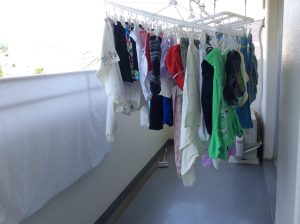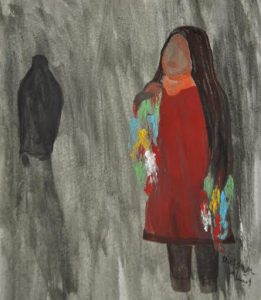
by ThinkSayBe | Oct 12, 2015 | 2015, Awareness, Being Thankful, Economy, Environment, Gratefulness, Helping, Human Rights, Humanitarian, Life, Natural Disaster, Nature, News, North America, Social Equality, Social Good, ThinkSayBe, Tragedy, Uncategorized, USA, Water, World Events, World Motherhood

Last week, South Carolina experienced the worst flooding is has seen in 1,000 years. World Mom, Sophia, shares her search for clean water after the storm last week…
Today the National Guard had two posts at which troopers were giving out clean water bottles by the case. As I prepared to go get some of this water, I thought of the safest, most effective and expeditious way of getting through the line of people waiting.
Would there be a truck at which troopers would be handing out the cases? Would there just be a group of us standing there with no adhered-to order, or would there be a line? How could I carry more than one case back to my car? I surely couldn’t get to the front of the line (or group) more than once… Maybe I should take the stroller, and put as many cases of water on it as I could take. (more…)
I am a mom amongst some other titles life has fortunately given me. I love photography & the reward of someone being really happy about a photo I took of her/him. I work, I study, I try to pay attention to life. I like writing. I don't understand many things...especially why humans treat each other & other living & inanimate things so vilely sometimes. I like to be an idealist, but when most fails, I do my best to not be a pessimist: Life itself is entirely too beautiful, amazing & inspiring to forget that it is!
More Posts
Follow Me:


by Melanie Oda (Japan) | Apr 17, 2015 | 2015, Awareness, Cooking, Cultural Differences, Culture, Domesticity, Expat Life, Eye on Culture, Family, Food, Health, Home, Identity, International, Japan, Life, Life Balance, Living Abroad, Maternal Health, Me-Time, Motherhood, Multicultural, SAHM, Social Equality, Stress, Time, Traditions, Womanhood, World Motherhood
 I start my morning here in Japan the same way every day: by cleaning out the drain trap.
I start my morning here in Japan the same way every day: by cleaning out the drain trap.
Not very pretty, I suppose, but I’ve learned the hard way that it needs to be done frequently and well. The drain traps here in Japan are metal mesh to prevent food from going down the drain. They get gross very quickly.
I’m pretty sure I started out my days when I lived in the US with a cup of coffee, which seems quite glamorous by comparison!
In spite of our gains in education or employment opportunities over the last century, much of our time as women gets taken up by mundane household tasks like this. Women all around the world are doing the same kind of things: laundry, food preparation, cleaning, child care, though in very different ways.
It makes me curious. How much of your time gets spent on “daily chores?” What kinds of things do you need to do every day? Do you do them alone, or do you have help?
Perhaps it is a boring topic, but for comparison I thought I would share a little bit of what housework is like here in Japan.
Laundry gets done daily in most families. We have washing machines, but most people don’t have dryers. In a country with cold winters, humid summers, and a rainy season, keeping up with the laundry feels like a daily battle! When the weather is not cooperative, laundry gets hung from curtain rails or any other overhang that can be found indoors. We have to bob and weave our way around the house. Imagine that Catherine Zeta Jones movie, but with laundry instead of lasers.
I do the shopping most days as well. This is quite common here in the greater Tokyo area, where storage space is limited and many people do not have cars to allow buying in bulk. Milk is sold by the liter; laundry detergent in 500ml bottles. The biggest shopping challenge is buying rice, which comes in 5 or 10kg bags.
I need to dust and vacuum every day. This is much more often than we did in the US growing up. I’m not sure why Japan is so dusty. Could it be the tatami floors? The single pane windows? The small living space? And more important than why, how can I make this dust accumulation stop?
Japanese cuisine seems to be gaining in popularity around the world. Many Japanese people eat a full meal in the morning (though this is slowly changing,) as well as at lunch and dinner. Japanese bento are also getting a lot of attention on the Internet for being nutritious as well as visually appealing. Overwhelmingly, the cooking is done by women. (Personally, since my children’s lunch is provided by the school, most days I cook twice.)
Like most families here, we have a gas stove-top, a rice cooker, and a microwave combined with an electric oven for cooking. My mother-in-law has a separate gas burner that can be placed on the table for doing things like sukiyaki or okonomiyaki, foods that are consumed as soon as they are cooked by the family from the same dish. My children are still a bit too small for me to attempt this at home.
I think many of us around the world are doing these same things, but the nitty-gritty of how we get it done and how often we do it are different. I can’t help but wonder what housework says about the values of the culture.
In the US, for example, many families take pride in a well-decorated home. In Japan that is much less important. (Perhaps because many women are spending all that time dusting and dodging laundry….)
What kinds of things are included in your daily duties? How do you feel about doing them?
This is an original post to World Moms Blog from our writer in Japan and mother of two, Melanie Oda.
The image used in this post is attributed to the author.
If you ask Melanie Oda where she is from, she will answer "Georgia." (Unless you ask her in Japanese. Then she will say "America.") It sounds nice, and it's a one-word answer, which is what most people expect. The truth is more complex. She moved around several small towns in the south growing up. Such is life when your father is a Southern Baptist preacher of the hellfire and brimstone variety.
She came to Japan in 2000 as an assistant language teacher, and has never managed to leave. She currently resides in Yokohama, on the outskirts of Tokyo (but please don't tell anyone she described it that way! Citizens of Yokohama have a lot of pride). No one is more surprised to find her here, married to a Japanese man and with two bilingual children (aged four and seven), than herself. And possibly her mother.
You can read more about her misadventures in Asia on her blog, HamakkoMommy.
More Posts

by World Moms Blog | Apr 1, 2015 | Feminism, Girls, Gratefulness, Guest Post, Human Rights, Husband, Priorities, School, Social Equality, Uncategorized, Women's Rights, Working Mother
 Kids complain about going to school today? Have them read this guest post, which comes to us from Ibtisam in Oman. You can find more of her wonderful perspective on her blog: ibtisammusings.com.
Kids complain about going to school today? Have them read this guest post, which comes to us from Ibtisam in Oman. You can find more of her wonderful perspective on her blog: ibtisammusings.com.
Sometime in the late 1960s, there was a six-year-old girl whose father did not believe education was of any benefit to her. However, because her eldest brother took a stand that education was her right, she went to school and was quite intelligent in her studies. She did not make it to high school, but those first few years meant the world to her.
Fast-forward to 1998. There was 18 year-old girl who just graduated from high school with grades that enabled her to receive a government scholarship to further her studies. She had a dream of studying somewhere abroad. Her father supported her endlessly without having a second thought about it.
Two women, my mother and me, received a life-changing education made possible by the men in our family. In our part of the world, and specially for some women, it was like asking for the moon. The sad thing is, that is still the case for many other women.
In 2010, my husband registered me for a Master’s degree course in business administration. I had two children at that time who were 2 and 4 years old. I had a house to take care of, but he believed I could do it, and I did do it with his full and endless support. He ’empowered’ me to do the course before himself, although it is what he wanted to do for many years.
I worked for ten years at a hospital, then I quit to start my own business. I still can remember one woman I know crying as she wanted so badly to start her business and follow her dream, but her husband gave her a hard time and made it impossible for her.
Initially, the thought of quitting my job scared me to death. Then, the moment that moral support from my husband was there, everything seemed easy. This year, my sister-in-law had an opportunity to work abroad. She found the courage to go for it when her husband, my brother, told her not to worry and that he would support her decision, no matter what it was.
Maybe many will think, ‘how does a man’s decision affect a woman’s choices?’ Well, in my society it does. You can find few girls who managed to follow their dreams despite the resistance they faced. However, this can be so tough and risky in a collectivist society where family ties are sacred.
Maybe we are living the good time for women empowerment in my country and many other countries around us. I hear and read the word ‘woman empowerment’ everywhere in our media. There are conferences, workshops, lectures etc. on this specific issue. This is the reason why I decided to write this. I have this deep feeling of gratitude towards the men in my life, and for men like them who recognize the rights of women. Without their support, love and encouragement, ‘woman empowerment conferences’ would be a story with a sad ending for us.
picture credit: the author
World Moms Blog is an award winning website which writes from over 30 countries on the topics of motherhood, culture, human rights and social good. Over 70 international contributors share their stories from around the globe, bonded by the common thread of motherhood and wanting a better world for their children.
World Moms Blog was listed by Forbes Woman as one of the "Best 100 Websites for Women 2012 & 2013" and also called a "must read" by the NY Times Motherlode in 2013. Our Senior Editor in India, Purnima Ramakrishnan, was awarded the BlogHer International Activist Award in 2013.
More Posts

by ThinkSayBe | Feb 13, 2015 | 2015, Awareness, Communication, Cultural Differences, Education, Human Rights, Humanity, Parenting, Prejudice, Social Equality, ThinkSayBe, World Motherhood

Racism |ˈrāˌsizəm|noun: The belief that all members of each race possess characteristics or abilities specific to that race, esp. so as to distinguish it as inferior or superior to another race or races.
Prejudice |ˈprejədəs|noun: Preconceived opinion that is not based on reason or actual experience: English prejudice against foreigners | anti-Jewish prejudices.• dislike, hostility, or unjust behavior deriving from unfounded opinions.
These are the definitions of these two words as provided by the dictionary on my Macintosh device. Has everyone experienced racism and prejudices by either acting or feeling these words out, or by being victims of them? For those of us who have been prejudiced against a person or people. and have been racist against others: have we been honest with ourselves about it?
(more…)
I am a mom amongst some other titles life has fortunately given me. I love photography & the reward of someone being really happy about a photo I took of her/him. I work, I study, I try to pay attention to life. I like writing. I don't understand many things...especially why humans treat each other & other living & inanimate things so vilely sometimes. I like to be an idealist, but when most fails, I do my best to not be a pessimist: Life itself is entirely too beautiful, amazing & inspiring to forget that it is!
More Posts
Follow Me:


by Melanie Oda (Japan) | Jan 8, 2015 | 2014, Awareness, Child Care, Childhood, Culture, Domesticity, Education, Expat Life, Eye on Culture, Family, Feminism, Grandparent, Home, Husband, International, Japan, Life, Life Lesson, Living Abroad, Marriage, Me-Time, Motherhood, Multicultural, Parent Care, Parenting, Priorities, Relationships, Responsibility, School, Social Equality, Womanhood, Women's Rights, World Motherhood, Younger Children
 Gender equality has been in the news quite a bit in Japan recently, sort of, and some things have happened closer to home that have me thinking.
Gender equality has been in the news quite a bit in Japan recently, sort of, and some things have happened closer to home that have me thinking.
It started when a (female) Tokyo assembly member was heckled in a sexist way. Then Prime Minister Abe introduced some new policies to let women “shine.” (He needs to get them doing something for the economy.) He even appointed several women to cabinet posts, for about five minutes, until they were slapped back down into their places over minor scandals.
In Japan, people are talking more about issues women face but no one seems to be doing much about them.
(Lest I forget: strangely enough, the declining birth rate is treated as a “women’s issue.” I seem to remember my husband being involved, too.)
I never considered myself a feminist growing up. Some members of the evangelical, conservative community I grew up in doubtless felt “feminist” was a new version of the “F-word.”
OK, so I went to a high school with more sports options for boys than girls. And yes, girls were encouraged to take chorus and home economics instead of woodworking or mechanics. So maybe I heard men from my community refer to grown women as “broads” or “gals.” There also were some restrictions at church regarding women’s and men’s roles. But I never felt that possessing certain types of baby-making parts limited my potential.
Then I moved to Japan, where gender roles are more firmly entrenched and my way of thinking slowly changed.
As I get older, and because I am a mother, I find that I am limited in ways that I couldn’t have foreseen as a young girl.
Some people may find life here in Japan freeing. If you aspire to be a homemaker a la Martha Stewart, then your life’s work would be very much respected and appreciated here. My husband wouldn’t bat an eyelid if he came home to a messy house because I’d spent the day at a preschool mothers’ lunch. He knows that is part of the job (on the other hand, it would never occur to him to pick up the mess himself.)
If, as a woman, you have other aspirations, Japanese culture seems designed to work against you. The glass ceiling is very much in tact. On the news here you do hear issues like lack of childcare and “maternity harassment” being addressed. But what gets talked about less often is that to many women, including myself, it feels as if there’s a glass door as well.
It’s my front door.
Before a woman can even think about what is facing her out in the world, she needs to address the forces that are keeping her at home. Some of these are practical, some are logistical, some are cultural and perhaps peculiar to Japan and it’s work culture.
For me, it starts with my husband: He leaves home at 7am every morning, but I have no idea what time he will be back. Sometimes it’s 7pm. Sometimes it’s midnight. He may be in the office that day, or he may suddenly be sent to another prefecture. He’s made international trips on 12 hours notice. I cannot depend on him being home at a designated time, by no fault of his own. The idea of him taking time off with a sick child is preposterous in the extreme.
I have been lucky enough to have two job offers recently, both of which would be more or less during school hours, but neither is nearby. If a child were to get sick and need picking up, or if god-forbid there was a natural disaster (which is always in the back of your mind if you are a mother in Japan,) then my husband would be closer. I mentioned that, and he completely shot me down. Not just the idea of him picking up the kids in case of an emergency, but the idea of a job anywhere outside of cycling distance from the school.
We live in a residential neighborhood. I patch together some part-time work here and there, but it’s not like there are loads of professional opportunities in a two kilometer radius.
I suddenly felt very limited, penned in, in a way I haven’t felt before. The glass door was slamming in my face.
I don’t think I’m alone in this conundrum. Go to almost any supermarket in a residential area during the day, and you will see women in their prime working years manning the register. Many of these women have university degrees. Many have licenses and qualifications to be doing other kinds of work, but they want to stay close to home. They also need salaries to stay under $10,000 year or face a peculiar Japanese tax code and insurance system that penalizes families where both partners have incomes over that amount.
Then there are my kids: Like 2/3 of Japanese women with children under 6, I stayed home when they were small. They now completely depend on me for everything. It seems to have never entered their minds that someone else could give them a bath or help them find their missing socks, mostly because no one else has ever done anything for them. Especially when they are sick, they want only me. It was very hard when my daughter was in the hospital, both children wanting to be with me and emphatic that no one else would do.
But now my youngest is in elementary school, and I would like to just be doing more of something….else, but for me to plunge into the workforce would be a huge adjustment for my children. Is it worth the stress? Can we survive what is sure to be a painful adjustment period?
Maybe if I had more family support, it would feel less impossible but as it is, it seems like everyone is against me.
Which brings me to the final characters in this comedy, my in-laws: They say they’ll watch the kids, then they change their minds. Or something better comes up. From their point of view, this house and these people are completely my responsibility. Anything they do is extra credit.
To be honest, we’re getting to the point where my in-laws need my help more than I need theirs.
They aren’t shy about letting me know my place.
One day not too long ago, my son was playing at the park with his friends. It was getting close to homework time, so I called him and told him to come home. He said he was playing with Jiji (which is an endearing term for grandfather used in our region of Japan,) and could he play for a bit longer? Since he was out with an adult, I said okay.
The next day, I got a verbal whipping from my father-in-law over the phone, accusing me of being irresponsible, a bad mother. It took me a few minutes to understand why he was saying this, but when I got to the bottom of it, I realized my son had lied to me. He was playing with his friends when Jiji walked by and told him to go home. My son told him I wasn’t at home and said he couldn’t come back until I did. (I must have called right at this point.) “How dare you not be home in the afternoon?” said Jiji.
Putting aside that none of this nonsense was true, so what if I wasn’t home in the afternoon? Of course I wouldn’t have left the kids to wander the neighborhood like stray dogs, but why was my not physically being inside my house such an issue to him? His assumption that it was my duty to be always available to everyone took me by surprise.
I could almost hear the glass door slamming again.
There are also other barriers for women in Japan—an over active PTA for one, and a myriad of community responsibilities attended to exclusively by women for another. I imagine most women in the world encounter both the “glass door” and the “glass ceiling” in some form or another, but in Japan only one of these factors is seems to be getting much attention. Building new daycare facilities isn’t enough; the government stating goals to increase women’s participation in the workforce isn’t enough. Until we do something about that glass door, nothing will change for one of the best educated, least utilized group of women in the world.
Do you feel you are fulfilling your potential, both at work and at home? What’s the situation like in your country?
This is an original post for World Moms Blog from our writer and mother of two in Japan, Melanie Oda.
If you ask Melanie Oda where she is from, she will answer "Georgia." (Unless you ask her in Japanese. Then she will say "America.") It sounds nice, and it's a one-word answer, which is what most people expect. The truth is more complex. She moved around several small towns in the south growing up. Such is life when your father is a Southern Baptist preacher of the hellfire and brimstone variety.
She came to Japan in 2000 as an assistant language teacher, and has never managed to leave. She currently resides in Yokohama, on the outskirts of Tokyo (but please don't tell anyone she described it that way! Citizens of Yokohama have a lot of pride). No one is more surprised to find her here, married to a Japanese man and with two bilingual children (aged four and seven), than herself. And possibly her mother.
You can read more about her misadventures in Asia on her blog, HamakkoMommy.
More Posts

by Purnima Ramakrishnan | Dec 18, 2014 | 2014, India, Inspirational, International, Life, Life Balance, Motherhood, News, Parenting, Purnima, Social Equality, Social Good, Spirituality, Terrorism, The Advocates of Human Rights, The Alchemist, Tragedy, World Events, World Moms Blog, World Motherhood, World Voice

I was channel surfing on the TV yesterday afternoon and I was dumb-struck by the news of the attack on the army school in Peshawar. The latest reports say that almost 150 people were killed, the majority being children.
A mother was lamenting, “This morning my son was in a uniform, now he is in a coffin.”
A student was crying out that his mother, who was a teacher there, was dead.
On another website, I read that children reported how, when they ran out of their classrooms, they could see their friends’ bodies strewn around the school compound. One child reported that two bodies fell on him and then he realized they were his dead friends. Forget violent video games. Somewhere in the world, children were watching and being part of a very violent game, a game they had been caught in unawares, unwittingly, forcefully and in a confused illogical way.
‘Glory be to God,’ a terrorist screamed and gunned down the children who were hiding beneath the benches.
God? I have no words… Did he say “God???”
I generally do not venture into writing controversial topics in Journalism or in the blogging world. I just shy away from anything which would cause any discomfort for another party. But this one really broke my heart… It hits so close to home. I am a mother first. And I feel for all those mothers …
Yesterday night when I was discussing this incident with a friend on the phone, my son overheard it and started asking me a few questions. I changed the topic because I was not prepared to talk about it.
I was not even prepared to talk to my friend about it. Imagine, a mother going through it, living it … It just broke my heart. Was she prepared to not see her child anymore when she was bidding him goodbye in the morning?
This morning, when my son was ready for school, my heart was stuck in my throat. As he got into the car and waved back at me, I imagined what was going on in the hearts of all those mothers who had lost their kids. I imagined all those families who had lost their mothers (who worked as teachers) and I was lost for words or feelings.
I almost wanted to stop him and say, “Do not go to school.” But I waved back enthusiastically reminding him to eat the biscuits because he had not had his breakfast and chastised him for not having completed his glass of milk and let go of my heart out of my body.
And I know I am going to talk to him about it when he comes back home in the evening. I am going to tell him what happened in Peshawar, in our neighboring country.
I wouldn’t even say Pakistan is another country because just a few decades ago, India and Pakistan were the same country. I am going to tell my son that his brothers and sisters living just a few miles away were victims of violence and hatred and vengeance.
I am going to tell him that it is very necessary to be filled with love, to be able to spread love, peace and kindness.
To be filled with happiness, joy and life.
I am going to sow fresh seeds of love into his heart. I am going to teach him again that he has to nurture those seeds of love and allow them to grow into huge trees of love, spreading shade all over humanity.
I am going to tell my son again, how unconditional love is the only solution, and that alone breeds more love.
I am going to tell him he should not hate those perpetrators of crime either, who gunned down his brothers and sisters, but pray they change over too.
Yes, it is a tall order. But I think it is possible. If it is possible to think it, it is possible to do it, it is possible that somewhere in the future this reality manifests.
I feel it in my heart. If all of us World Moms can do this tiny bit to our children today, teach them that love is the only solution for hatred and violence, then the children would believe it too and there might be hope for the next generation.
So, dear mothers, this evening, when your children come home from school, give them all an extra big, tight hug and talk to them about this, and ask them to pledge their solidarity in spreading love and peace.
Today, World Moms, representing all the countries we write from, stand in solidarity and support of all those victims, the families and friends, and share their grief and express their prayers and love.
I conclude with this short nursery rhyme… and might I remind you, as a dear friend reminded me yesterday: there is a wealth of wisdom in Nursery Rhymes, even for adults.
This little light of mine,
I am going to let it shine.
Let it shine, let it shine, let it shine.
Everywhere I go,
I am going to let it shine.
Let it shine, let it shine, let it shine.
Deep within my heart,
I am going to let it shine.
Let it shine, let it shine, let it shine.
All around my friends,
I am going to let it shine.
Let it shine, let it shine, let it shine.
Let it shine, let it shine, let it shine.
This is an original post from our World Mom and Senior Editor in India, Purnima Ramakrishnan on the occasion of the “#DayOfTheGirl Child.”
Her contributions to the World Moms Blog can be found here. She also rambles at The Alchemist’s Blog.
Photo credit to the author’s friend, Mahalakshmi.





















